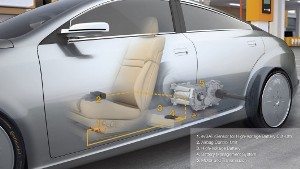Feb 16 2011
The evSAT (Satellite for Electric Vehicles) sensor developed by Continental enables plug-in hybrid and electric vehicles to instantly switch off the high-voltage battery if the vehicle is in charge mode during a collision.
Dr. Axel Gesell, Senior Manager, Platform Development Sensors and Satellites, explains that during the charge mode, the evSAT acceleration sensor remains active and in the event of a collision, detects and passes the information to the battery management system following, which the high-voltage battery is immediately shut off.
 evSAT sensor in car
evSAT sensor in car
The advantage of the evSAT sensor is that it enables emergency service personnel to recover the vehicle without the risk of an electric shock when they come in contact with the metal parts or have to cut their way through to rescue victims, especially since plug-in hybrid and electric vehicles require high-voltage batteries of up to 400 volts (twice as much as the standard domestic plug socket) to power them. In the United States, the law requires for the power supply voltage in the vehicle to fall lower than 60 volts within five seconds from the occurrence of the accident. Germany does not have an existing law, which requires the same.
The evSAT sensor consists of a standalone triaxial sensor coupled with a CAN interface. When the vehicle is in the charge phase, the airbag system and other electronic devices are non- functional and thus to avoid modifying the airbag system to adapt to new requirements, the evSAT was developed by Continental.
An algorithm is used by the accelerator sensor to perceive a side, frontal or rear collision and instantaneously through the CAN interface transmits a signal, which switches off the battery in a matter of half a second. Another function of the evSAT is that it deactivates the battery within four seconds if it detects a rollover during the driving mode. In this case, the battery is deactivated within four seconds at the most. In the event of other types of driving accidents the evSAT remains inactive.
A German vehicle manufacturer will undertake a series production of the evSAT in 2012.